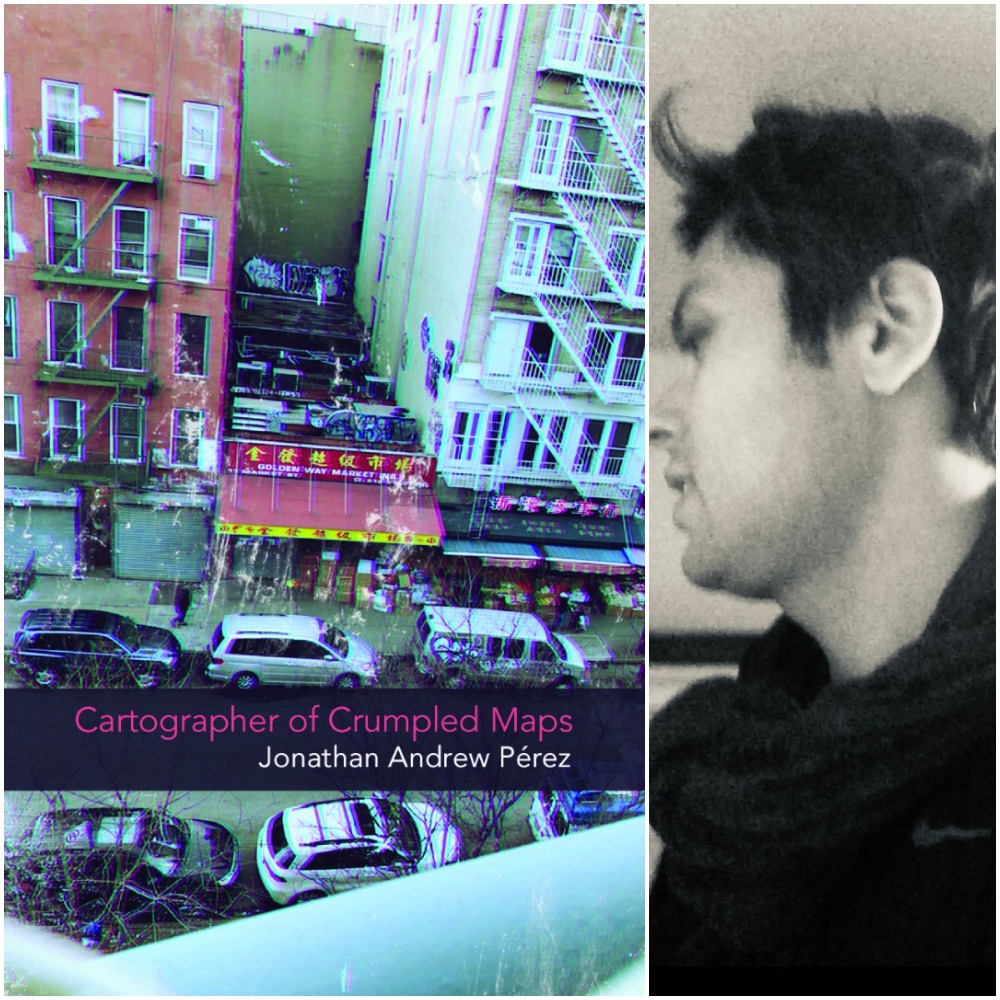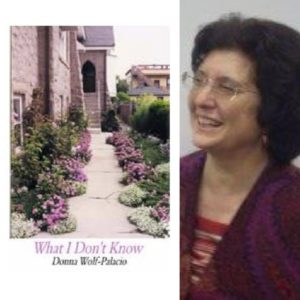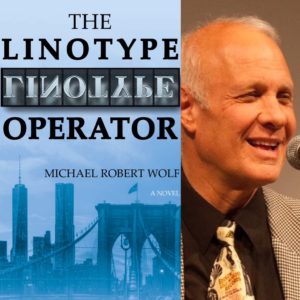Jonathan Andrew Perez’s The Cartographer of Crumpled Maps cleverly subverts and displaces the idyllic essence of the pastoral in service of an ethics society has consistently betrayed. The poems in this chapbook, occasionally referential yet always original, find their verve in the asymmetry between the beauty of our natural world and the brutality of the systems—legal, governmental and cultural—that characterize our society as, too often, undermining that beauty, if not erasing it, the fates of marginalized people living beneath punitive systems being of great and genuine concern. Taken collectively, this work is as rewarding as it is challenging, so be moved, be challenged, and then challenge.
–Cortney Lamar Charleston, CAVE CANEM FELLOW, 2016 SATURNALIA BOOKS POETRY AWARD PRIZE SELECTED BY D.A. POWELL; RUTH LILLY AND DOROTHY SARGENT ROSENBERG POETRY FELLOW, POETRY FOUNDATION
Jonathan Perez‘s debut declares itself a “Criminal Justice Pastoral,” and quickly the reader learns what that means: subjects of justice lost and received, charmed and musical prosody, birds catalogued like discovery briefs, black bodies piling in the dirt and rivers of Mississippi. Taking aim at the “historically undernourished,” these are poems of an American man of color facing down American-made horrors, and in the end, finding the necessary and essential affirmation: “Nothing will hurt us. / We are invincible.” Jonathan, then, is a poet charged with, and fueled by, justice for this moment; his “The Cartographer of Crumpled Maps” is an invitation for us to join him.
–Joshua Roark, Editor, Palette Poetry
“Making use of the roles of witness, citizen, and archaeologist, Jonathan Andrew Pérez takes in the city: its people, history, shadows, and light to produce brave, unyielding poems that seeks truth when none is visible nor accessible. Pérez calls to attention America’s cyclical injustices as he scribes, ‘All is buried beneath the / landscape of nolo contendere.’ Through his criminal justice pastorals, odes that mirror elegies, and subverted definitions Pérez excavates America’s haunting past and finds language for us to challenge, discuss, and heal from the atrocities committed to our society’s most vulnerable and marginalized people. I celebrate and am charged by this poet’s generous, and fearless debut.”
–Jorrell Watkins, Interdisciplinary Artist & Educator
Jonathan Perez‘s The Cartographer of Crumpled Maps is a challenging and insightful new collection that reckons with the injustices currently so pervasive in our world. Addressing catastrophes both moral and environmental, Perez’s poems turn our attention from the particular instance back out to the broader context from which it springs, alerting us through his intuitive uses of spacing and line breaks to the particularly linguistic features that mark a troubled age. Seamlessly blending vocabularies drawn from the law and from the natural world,The Cartographer of Crumpled Maps shows us again and again how, in a culture devoid of justice and divested from ecological responsibility, “All is buried beneath the landscape of nolo contendere.”
–Stu Watson, Editor of Prelude Magazine and author of Communicatingroups
A geologist of US imperialism, Pérez reads history’s striations with a ruthless eye, but not without hope. His incantations mine the pastoral tradition, shifting earth so that we might witness for ourselves the unnatural life of injustice.
–Roy Pérez, assistant professor of ethnic studies, University of California, San Diego






Ben Bartu –
THE MUD JAR OF EMPATHY
A review by Ben Bartu
When envisioning a chapbook, a project of epic scope is rarely what comes to mind. However, this is precisely what Jonathan Andrew Perez has conjured in the thirty-odd poems contained within his new collection, The Cartographer of Crumpled Maps: A Criminal Justice Pastoral (hereafter referred to as Cartographer). Marrying the themes, form, and style of the American Pastoral to urgent political realities, including America’s many systems of advantages, its violent institutions, and callous legal infrastructures, Perez underscores a fine wire of tension between the world as it is and the world as it is stylized to be. Resulting is a gorgeous collection at once expansive and self-cannibalizing — to read one of Perez’s poems is to read a flock of startled birds.
This image might belie the notion that Cartographer is a difficult book. In most ways, it is. The subject matter, for better or worse, is never flowery. Almost every poem invites multiple readings. In each the pastoral form is working against the political, rather than in support of it. It is a form designed to parse, and throughout Cartographer Perez succeeds in subjecting the themes he wishes to discuss to this simplifying form without ever letting them succumb to this simplicity. In Perez’s poems, voices play against one another, always complicating, suspicious of easy harmony.
In the poem “Great Blue Heron: The Moon Is A Blood Moon,” we see this joining at work. Lines like “Cattail and waterlily, / emblematic of a missing feature,” & “All is buried beneath the landscape of nolo contendere,” at once pay homage to and eschew the poetic tradition they root themselves in.
Just a few pages later, a poem titled “Choose Your Own Adventure,” is dedicated to the late civil rights activist Lamar Smith whose 1955 murder “remained unsolved after 30 white witnesses did not come forward.”
HERE, LAVENDER SITS ON YOUR PILLOW,
WHILE SCRUB-GREY HAIRSTREAKS MUNCH EARLY MORNING DEW,
THE CASE CLOSED, BURNT BODY NOT MADE ANEW.
Reading the ode, Lorca’s “Lament for Ignacio Sánchez Mejías,” came to mind; rather than using the language of magical realism to elegize, however, Perez has chosen the language and music of the American pastoral. The effect is devastating.
The simple and the actual are not the only ideas at work in this collection, nor are they even the only ideas which may be observed along the boundary of the American Pastoral and the American criminal justice system. A less foregrounded back-and-forth between the endemic and the manufacture, the natural and the institutional, is taking place over the course of this collection. The alarming spell of institutions is the way they can come to seem utterly natural, often in as little as a single generation. Few seem better equipped than Perez to guide us through this muddled landscape.
One of the collection’s most standout poems, “Barn Owl: Burn Barn, Burn,” begins with a definition of terms — “Barn (n.): that thing that looks like a house, but has high vaunted ceilings.” — Perez tests the limits of his Cartographer’s theory, interweaving the personal, political, and pastoral, and seeing what emerges on the other side. It is testament to Perez’s skill that the poem is made up almost entirely of couplets — as with a chapbook, one rarely enters prepared for grandiose scope. But once again, as he has with every other pastoral in Cartographer, Perez delivers.
BURN (V.): TO LOSE AND BEGIN WITHOUT I.D.
IN ME SITS A MUD JAR OF EMPATHY:
FOR THOSE WHO LIVED.
THE OPPOSITE OF FUEL IS ENTROPY.
THERE IS NO JUSTICE IN FOURTH-GENERATIONS.
THE OPPOSITE OF HATE, THE SHARP SHRILL OF LOVE,
BELONG A BURNING PLEDGE, A FOLK SONG OF DEATH.
AFTER HIS DIVORCE, MY FATHER RETURNED HIS BOOKS
TO THE LIBRARY OF LOST BORROWING CARDS.
HE RETURNED HIS-PANIC, AND TOOK A TERRIBLE LEAP
ACROSS THE COUNTRY, FROM ME LEFT NO HISTORY.
Perez’s debut chapbook is an important contribution. It is a work unafraid of testing the capacity of the intricate to not only live alongside the simple, but survive it. It is work where one might find a place to live.